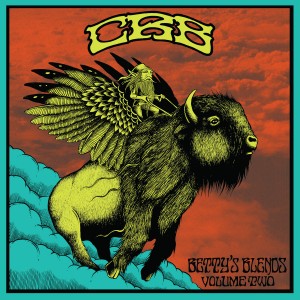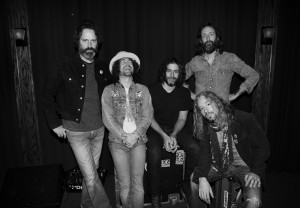Rules have never really been a problem for the Chris Robinson Brotherhood. The group, led by former Black Crowes frontman Chris Robinson, have independence embedded their DNA. Unconstrained by record labels or other interests, the band’s prime directive has always been crafting incredible music and presenting it in raw form to audiences around the country.
With their last album, 2014’s Phosphorescent Harvest, now more than a year behind them, Chris Robinson Brotherhood continues to tour relentlessly as they prepare to work on a follow up studio release. The band will make its way to Tipitina’s this weekend, where–in the vein of the Grateful Dead–they will treat fans to two full sets of music.
Robinson took some time to talk with us about the upcoming gig, as well as what’s next for the band, the ethos of the Grateful Dead, the importance of psychedelics, what it means to do things your own way and more.
Chris Robinson Brotherhood have been on the road pretty non-stop for the past month. How has the tour been treating you so far?
We really started back in January with what we’ve been doing this year. We took August off. It’s been good, man. It’s hard work, touring. But like anything–whether it’s the the creative part of our lives, the business aspect, logistical things or whatever–what we build, what we work on and what we’re focused on is something really positive. It’s a unique opportunity for all of us on a myriad of levels.
You guys have a show coming at Tipitina’s in New Orleans on Saturday. Does this city have a special place in your musical heritage?
I think it does for any American that likes music, whether they know it or not. Even when we started as teenagers in Atlanta, we would play Carrollton Station and drive over on weekends for club gigs. We’d make the trip in a van or a station wagon or whatever. Then subsequently, over the years, we did a lot of recording sessions in New Orleans and had deep friendships with people there. We’ve spent a lot of times there over the years. I think anyone is always thrilled to see New Orleans on the itinerary when you get your book.
 On past tours, you guys have brought out famed Grateful Dead live sound engineer Betty Cantor-Jackson to record some shows for your Betty’s Blends releases. Are there any plans to bring her out on this tour for another live compilation?
On past tours, you guys have brought out famed Grateful Dead live sound engineer Betty Cantor-Jackson to record some shows for your Betty’s Blends releases. Are there any plans to bring her out on this tour for another live compilation?
Betty recorded a bunch of stuff earlier in the year when we were on the West Coast. But yeah, we’re going to be doing a run in November where we play Atlanta and Charleston, if there’s anything to play in Charleston after this horrible flood. Then we’re supposed to do two nights in Raleigh and we’re bringing Betty out for that, so that’ll be her first field recordings outside of the West.
Speaking of connections to the Grateful Dead, that band has been getting a lot of attention lately on account of their 50th anniversary. I know that the Chris Robinson Brotherhood has a lot of connections to the Grateful Dead universe, has the ethos of the Grateful Dead had any influence on the ethos of CRB?
The ethos of the Grateful Dead, at its heart, is still the seed of this Bohemian culture. The idea that, through art and culture, you can do better things with your environment than what’s been given to you or that you can find other ways to attach yourself to a world that becomes less human. If the Grateful Dead is propagated off of some of those ideas, which they are, then yeah of course.
It doesn’t fit every model, but the problem with musicians is always commerce. People who used to hand out the money only cared about commerce, so they tell you what kind of art you should make. In this day and age, if you work hard and you have some good ideas, then you have a little bit more freedom to make things happen the way you want them to happen. The way you want it to sound, the way you want it to look, feel, smell and everything. Ultimately, anything that is not allowing that is outside the music business. The Grateful Dead tried it in a certain respect. That’s what’s interesting, besides the music that I love. It’s how you exist, how you create a model that’s outside the box of people 50 years ago that said “you’re not going anywhere, this is nothing.”
Much like the Grateful Dead, your last album Phosphorescent Harvest combined elements of psychedelic rock and a more rootsy, distinctly American sound. Is there a follow up to that album in the works?
We actually start in January. We have some shows in Denver for the New Year and then some shows around Colorado. Then we’re right into the studio the first week of January. We probably have eight or nine new songs now. We’re playing a few of them, only about three or four. We’re super excited, we’re going to make the record in Stinson Beach up in the Bay. We’re switching up some things in terms of producers and location. It’s our first record with our drummer, Tony [Leone]. We’re definitely searching for and aiming for some different things, sonically and composition-wise.
What’s the songwriting process like for CRB?
At this point in time, I’m more like the kind of person that tinkers on a hot rod in his garage. The way life works, the way life is when I’m at home, I’m a dad and a husband, so that’s the focus at home. When I work at home it’s in spurts, like four hours when nobody’s home and there’s no responsibilities, or when everyone goes to sleep. It’s kind of the same on the road. We’re working on our music when we’re not playing nightly. Yesterday was a day off in Nashville and we spent some time in my room working on three new songs that will hopefully be on this record. We have a day off tomorrow in Birmingham, which will probably be the same. Well, maybe even more since we know a lot of people in Nashville and don’t really know anyone in Birmingham. We’ll probably get an extra three hours in. When you’re young you have all this time to yourself, but now it’s more pragmatic. So that’s why I’m like this guy in his garage working on his engine, tinkering this and tuning that. By the time you take it out of the garage it runs perfect, and looks good and is ready to be seen.
How collaborative is that process?
It always has been collaborative. That was day one. I needed a majority of the material at the start to get it off the ground, but Neal [Casal] joining the band–we were collaborating day one. For this new record, Adam [MacDougall] and I have written more songs. We didn’t have any before. So Adam is writing more with Neal and I. It’s very open. My name in the band is just sort there so we can jump the line occasionally if we have to. Overall, it’s a completely collaborative effort. I’ve never told anyone what to play. I think that’s part of what makes a band great. Don’t fuck with it. It’s like if you’re at a dinner party with a bunch of interesting people, you have to find a way to fit into the flow of the conversation. Music’s the same way. As long as we think the conversation is interesting, there’s nothing to fret over.
 Will any of these songs evolve in the live arena before you put them down on an album?
Will any of these songs evolve in the live arena before you put them down on an album?
Yeah, it’s funny. We’re debuting a new song–well it’s on the board, we’re supposed to play it–called “Ain’t It Hard But Fair” that’s a prime example. I wrote the words and the chorus idea, Neal wrote the solo section and Adam sort of added these Baroque things, a coat hook here and a gaslamp there. It’s funny because even though we have the arrangement down and all the parts are written, there are a lot of little nuanced things that only happen after you’ve play the song 6, 7, 8, 20 times. Then you’re like, “Oh, here we are. Now we know where every little thing is going to happen.”
In past interviews you’ve talked about the importance of psychedelics. How have psychedelics influenced your music and your outlook on life?
If I put my interest in psychedelics into some sort of spiritual context, which is kind of not really a psychedelic context at all, but if I did, it allows me the courage to love more. It allows me the courage to keep fear in its respective place. Almost like if you had a poisonous snake in your house. People that keep poisonous snakes aren’t afraid of them [Laughs]. It gives me great perspective on so many levels. I see music, like many other people, as just a river of some ancient origin that flows into some other version of some primordial future. We’re just hanging out on the side, and we can jump in and swim around and make our living on the river banks. For me and music, psychedelics are a good companion to have by the riverside there. There’s a lot of knowledge and a lot of healing in that area as well. God knows this Earth could use all of those things.
We talked about what’s coming up soon for the Chris Robinson Brotherhood, but where do you see this project going over the next few years?
Hopefully some of the things we’ve set into motion have worked out. How do you get a band together and not have to be answering to people that you don’t want to answer to? How do you not feel like you’re working for a corporation when you don’t want to do that? So we had to build everything by ourselves. We’ve had to make sacrifices. We sleep on the bus every night and have hotels on days off. We set up our own gear. All that stuff. Are you prepared to put in the time it takes to build something brick by brick? In our minds, the great payoff is that, creatively and musically, we know it works.
We may not have the same avenues that are available to bands that are on major labels, but slowly but surely, every time we go somewhere it seems like more people are there. Every time we play, people know more of the songs. We meet people everyday that are affected by our presentation and that’s heavy for us too. It’s affected us. It’s changed the course of our lives. And not in any fucking super heavy way, but it affects us, just when people like our music. Betty was that way. She was like, “I’m going to record you guys because this is the first music that’s interested me like this in a long time.” We have to take that with great responsibility. That’s fucking cool. Like, wow.
The only way we can get anywhere and spread our musical gospel, if you will, is to just set up and play every night. I think this next batch of songs is the next part of the story, and it gives us yet another 10 or 12 songs for the repertoire. Every night, both of our sets are a different story.




